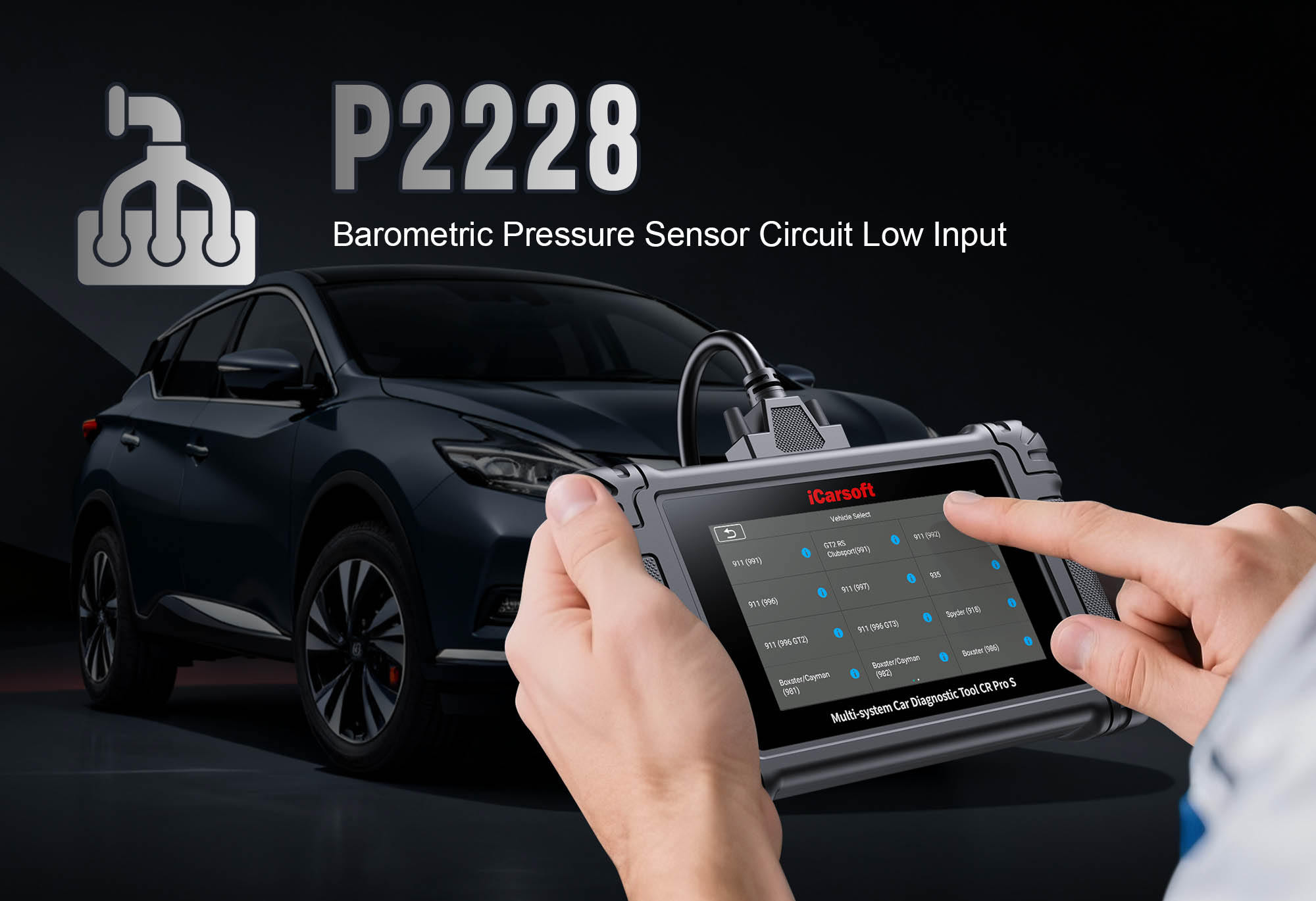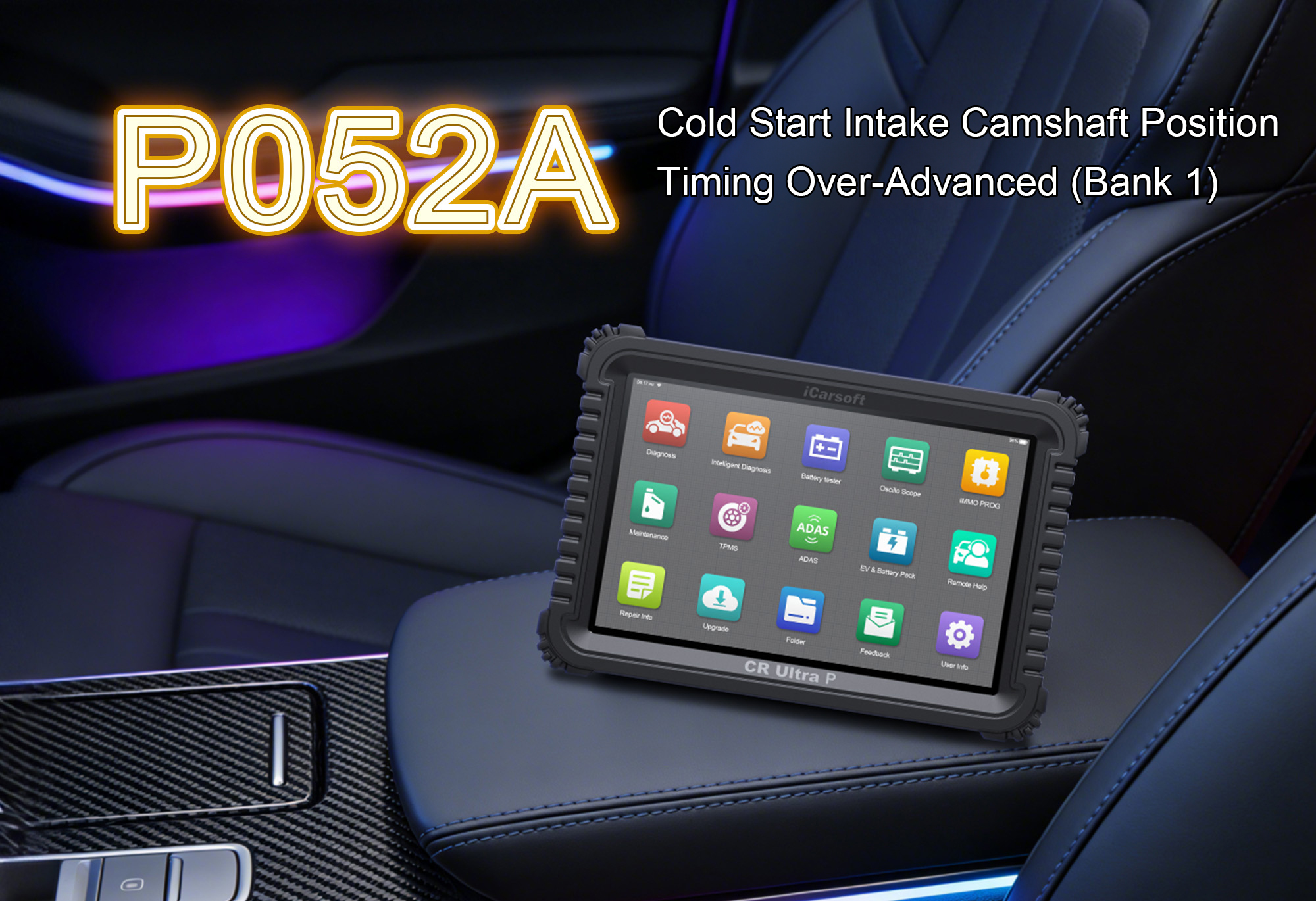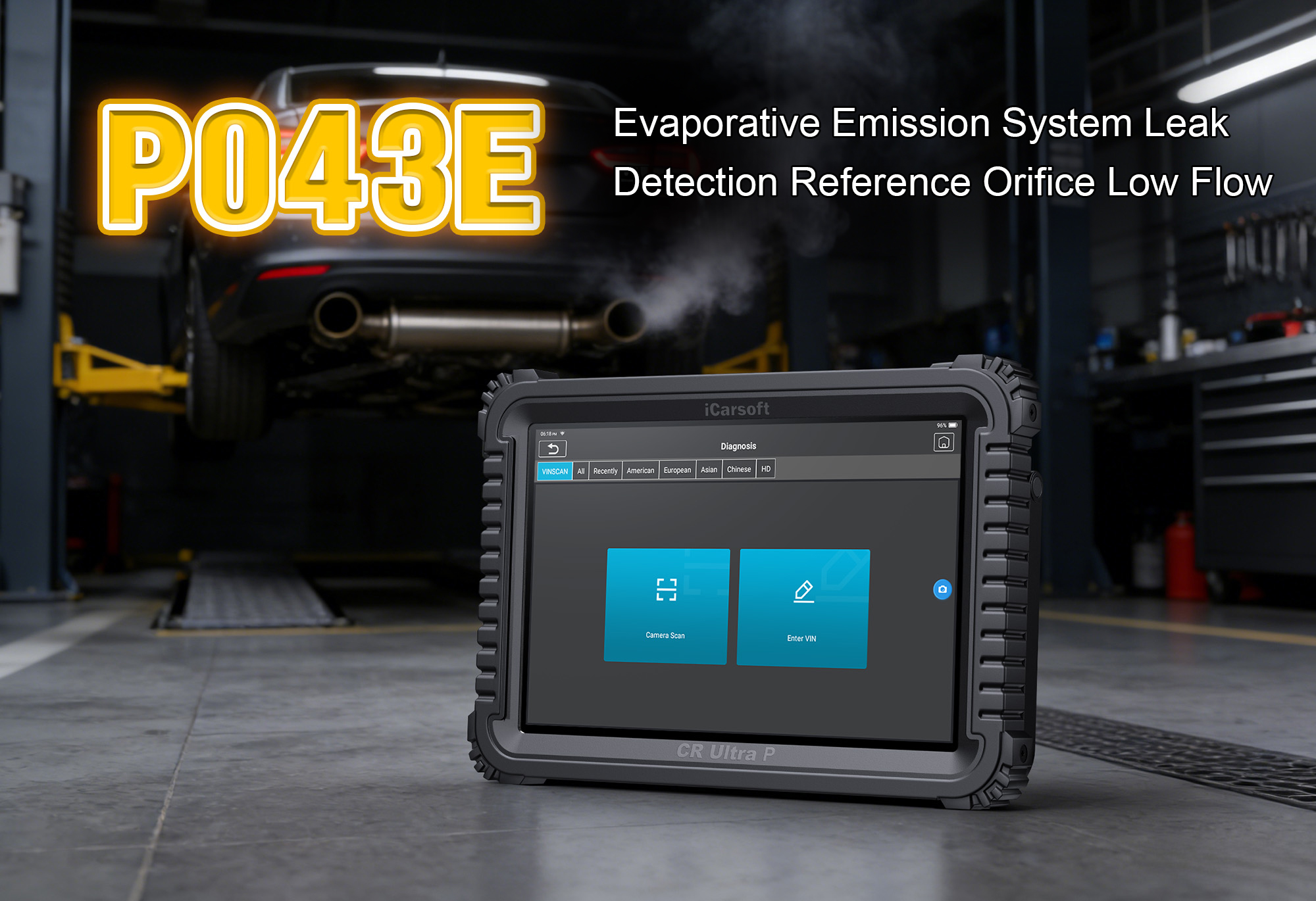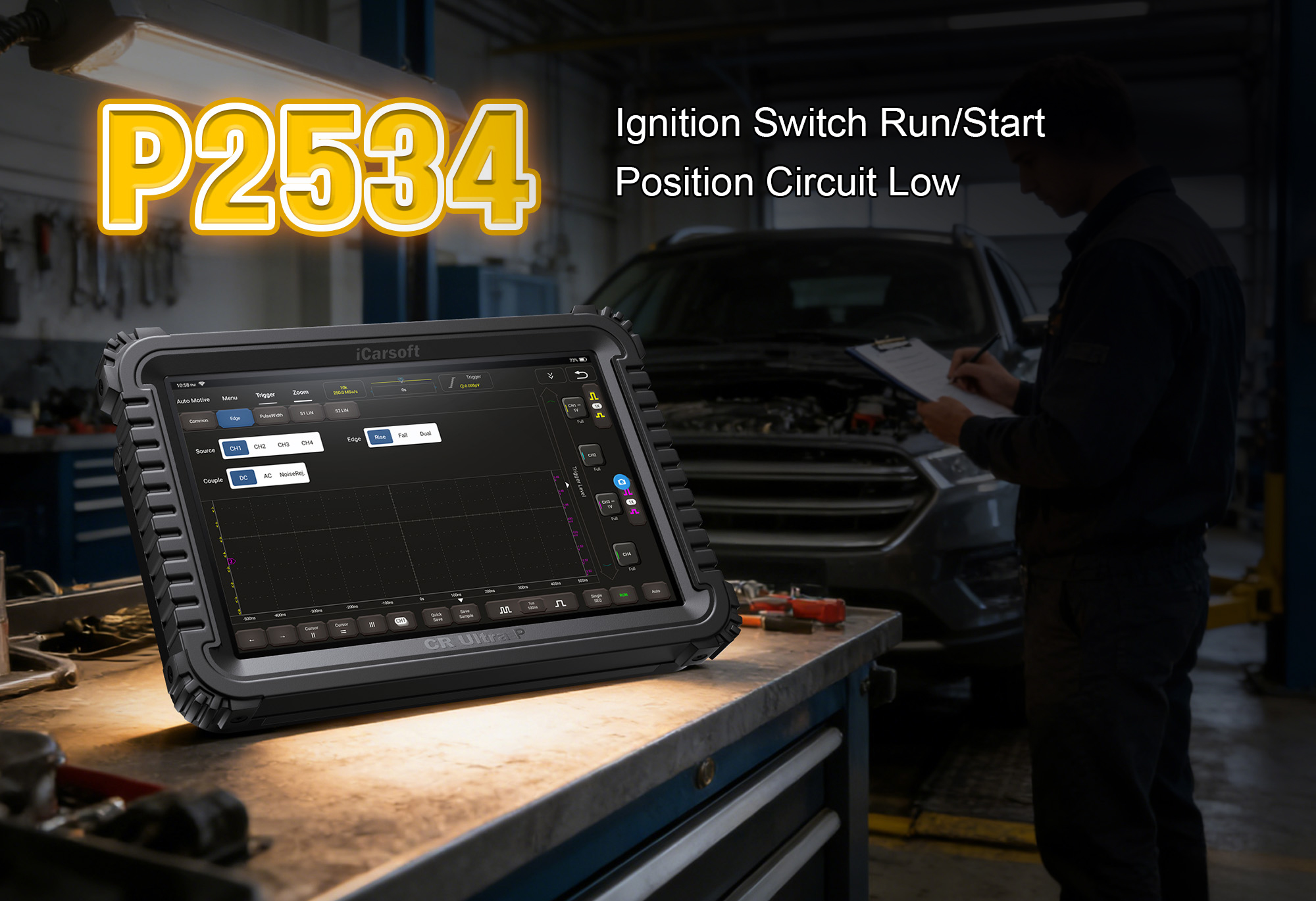Understand & Fix P2228: Atmospheric Pressure Sensor Circuit Range/Performance with iCarsoft CR Pro S
When your vehicle’s engine struggles with poor fuel efficiency, inconsistent idle, or sudden power drops, a diagnostic scan might point to P2228. This OBD-II code signals "Atmospheric Pressure Sensor Circuit Range/Performance," a fault related to the sensor that measures barometric pressure (atmospheric pressure) for the Engine Control Module (ECM). The ECM relies on this data to adjust fuel injection, ignition timing, and air-fuel mixture—critical for optimal engine performance, especially in varying altitudes or weather conditions.
Generic scanners often only flag "pressure sensor error" without specifying whether the issue lies in the sensor itself, wiring, or ECM. This ambiguity leads to misspent money on unnecessary parts. The iCarsoft CR Pro S eliminates guesswork with OE-level diagnostics, brand-specific data, and targeted testing features—ideal for resolving P2228 in Ford F-150, Toyota Camry, Chevrolet Silverado, and more. Below, we break down causes, symptoms, step-by-step fixes, and answers to common questions.
What Is P2228?
P2228 targets the atmospheric pressure (BARO) sensor circuit. The BARO sensor—either standalone or integrated into the Mass Air Flow (MAF) sensor/ECM—monitors surrounding air pressure. This data helps the ECM compensate for changes: at high altitudes (lower pressure), it reduces fuel delivery to maintain the correct air-fuel ratio. A "range/performance" error means the sensor’s signal is outside the normal 0.5V–4.5V range or changes erratically, disrupting engine tuning.
This code is common in vehicles frequenting mountainous areas (altitude stress) or with high mileage, such as Ford F-150 P2228 high altitude or Toyota Camry BARO sensor malfunction. It also appears in off-road vehicles like Jeep Wrangler, where the sensor may be exposed to dirt and debris.
Key Symptoms of P2228
-
Poor Fuel Economy: Most common symptom—incorrect fuel delivery wastes gas, noticeable in Chevrolet Silverado P2228 fuel efficiency issues.
-
Illuminated Check Engine Light: Steady/flashing CEL, often paired with "Sensor Circuit Fault" in newer models.
-
Inconsistent Idle: Engine fluctuates in RPM at stops, from imbalanced air-fuel mixture.
-
Power Loss During Acceleration: ECM can’t adjust fueling correctly, leading to hesitation or lag.
-
Hard Starting: Especially in extreme weather, as ECM lacks accurate pressure data for startup fueling.
-
Emissions Test Failure: Imbalanced combustion increases harmful emissions—common in Honda Accord P2228 emissions fail.
Common Causes of P2228
|
Cause
|
Description
|
|
Faulty BARO Sensor
|
Sensor degrades over time, especially if integrated into MAF (exposed to dirt/oil vapors)—common in Volkswagen Golf P2228 MAF-integrated sensor.
|
|
Wiring/Connector Issues
|
Frayed wires, corroded terminals, or loose connectors disrupt signals—prevalent in older vehicles like 2008 Ford Escape P2228 wiring fault.
|
|
Contaminated Sensor
|
Dirt, oil, or water blocks the pressure port—common in off-road vehicles with exposed sensors.
|
|
ECM Software Glitch
|
Outdated/corrupted firmware misinterprets data—triggers false codes in 2020 Toyota RAV4 P2228 software issue.
|
|
ECM Failure
|
Rare, but internal damage prevents processing the sensor’s signal correctly.
|
Why iCarsoft CR Pro S Excels at Diagnosing P2228
Resolving P2228 requires precise testing to identify the root cause. The CR Pro S stands out with pressure sensor-tailored features:
Brand-Specific Code Decoding
Translates P2228 into model-specific insights (e.g., "Ford F-150: BARO Signal Too High; Check Connector" vs. "Toyota Camry: BARO Integrated into MAF—Test MAF Voltage").
Live BARO Sensor Data Tracking
Monitors real-time voltage (0.5V–4.5V) and pressure readings, highlighting deviations triggering P2228.
Sensor Resistance & Continuity Tests
Built-in multimeter tests sensor circuit and wiring—pinpoints corroded connector P2228 issues fast, no extra tools.
Global Vehicle Coverage
Works with 50+ P2228-prone brands: Ford, Toyota, Chevrolet, Honda, Volkswagen, Jeep, and more.
ECM Reset & Software Updates
One-click ECM reset clears adaptive data; lifetime free updates fix glitches causing false P2228 codes.
Component Location Tool
Shows sensor position (standalone near intake or integrated into MAF)—saves time on diagnosis.
Step-by-Step: Diagnose & Fix P2228 with iCarsoft CR Pro S
-
Confirm P2228 & Gather Vehicle-Specific Data
Plug the CR Pro S into the OBD-II port, power on, and select AutoVIN Identify to detect make/model/BARO configuration.
Navigate to Engine > Fault Codes > Read Codes to confirm P2228. Tap Code Details for insights (e.g., "Honda Accord: BARO Voltage 5.0V (Over Max); Check Wiring/Sensor").
-
Analyze Live BARO Sensor Data
Go to Engine > Live Data > Sensor Data to monitor three key metrics:
1. BARO Sensor Voltage: Stabilizes at 0.5V–4.5V—fixed 0V (short) or 5V (open) = fault.
2. BARO Pressure Reading: Matches local atmospheric pressure (check weather app)—mismatch = faulty sensor.
3. MAF Data (if integrated): Compare MAF/BARO readings—consistent discrepancies = MAF issue.
-
Test the BARO Sensor & Wiring
1. Locate the sensor via Component Location tool. For standalone sensors: Disconnect connector, use Resistance Test (match OEM specs 10–50 ohms)—open circuit = faulty sensor.
2. Wiring Test: Use Continuity Test for breaks between sensor and ECM—repair/replace damaged sections. Clean corroded connectors with contact cleaner.
-
Inspect for Contamination & Update ECM
1. Contamination Check: Clean standalone sensors with compressed air; use MAF cleaner for integrated units.
2. ECM Update/Reset: If code persists, use CR Pro S to update ECM software (via Wi-Fi) or reset ECM—resolves software-related P2228 in Toyota RAV4.
-
Replace Faulty Components & Validate the Fix
- Install new OEM/aftermarket BARO sensor if testing confirms defects.
- Reconnect battery, use Engine > Fault Codes > Clear Codes to erase P2228.
- Test drive 50–100 miles, monitor live BARO data—stable voltage/pressure = issue resolved.
FAQs: P2228 Troubleshooting (Low-Competition Long-Tail Keywords)
Can I drive with P2228, or will it damage my engine?
Short trips are safe, but prolonged driving leads to poor fuel economy and potential misfires. Avoid extreme altitudes with Jeep Wrangler P2228 off-roading—incorrect fueling strains the engine. Diagnose immediately with the CR Pro S.
How much does it cost to fix P2228?
Costs vary: New BARO sensor = $50–$150 (parts + labor). Wiring repairs = $80–$150. The CR Pro S saves $100–$250 on diagnostics and avoids misreplacing the $500+ ECM. DIY P2228 repair Ford Escape cuts labor costs.
Why does P2228 keep coming back after clearing the code?
Root cause is unresolved—common culprits: partially cleaned BARO sensor or hidden wiring damage. Use the CR Pro S’s History Log to track recurrence—high-altitude triggers mean sensor failure under stress.
Is P2228 the same as P0108 (MAP Sensor Circuit High Input)?
No—P2228 = atmospheric (BARO) sensor; P0108 = manifold absolute (MAP) sensor. The CR Pro S clarifies differences, so you don’t mix up Ford F-150 P2228 vs. P0108.
Can a dirty air filter cause P2228?
Indirectly—if BARO is integrated into MAF, a dirty air filter contaminates the MAF. For Toyota Camry P2228 air filter link, replace the filter and clean the MAF (with CR Pro S guidance) to resolve the code.
How do I test a BARO sensor with the iCarsoft CR Pro S?
Use Resistance Test (disconnect sensor, probe terminals) and Live Data (monitor voltage at idle/rev). For Chevrolet Silverado P2228 sensor test, the CR Pro S shows OEM-specific resistance ranges.
Will P2228 affect my vehicle’s towing capacity?
Yes—incorrect fueling reduces power, limiting towing. For Ford F-150 P2228 towing issues, fix the code with the CR Pro S before hauling heavy loads to avoid strain.
How do I prevent P2228 from happening again?
Replace air filter every 15k–30k miles to prevent MAF/BARO contamination. For off-road P2228 prevention (Jeep Wrangler), install a sensor cover. Run monthly sensor checks with the CR Pro S during maintenance.
Conclusion
P2228’s fuel inefficiency and performance issues are frustrating, but the iCarsoft CR Pro S turns complex diagnostics into a straightforward process. Whether it’s a faulty BARO sensor in a Ford F-150, wiring issues in a Chevrolet Silverado, or software glitches in a Toyota RAV4, this tool delivers brand-specific data and testing to fix P2228 quickly and affordably.
With a 5-inch touchscreen, lifetime free software updates, and support for 50+ brands, the CR Pro S is a must-have for DIYers and mechanics. Don’t let P2228 drain your wallet—use the CR Pro S to resolve atmospheric pressure sensor issues and restore your vehicle’s performance.





